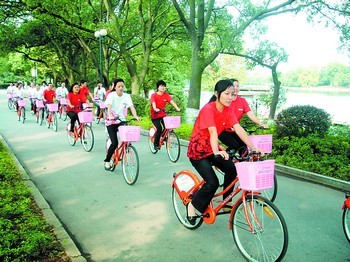In China, once called a "kingdom of bicycles," cycling for fitness is making inroads after years of soaring car ownership, officials say.
|

|
|
In China, once called a "kingdom of bicycles," cycling for fitness is making inroads after years of soaring car ownership, officials say. [Xinhua photo]
|
Bicycling for transportation was a hallmark of Chinese culture until the creation of an urban white-collar class in the 1990s led many to purchase automobiles instead. But now those same urban professionals are buying trendy, upscale bikes to pursue their fitness goals.
"Cycling is a remedy for obesity. Cycling invigorates and inspires me," said Shen Kailun of Hangzhou, capital of eastern China's Zhejiang province, who rode his bicycle up a hilltop in the city's "First Ride in 2009." "I'm now better off on my bike."
Another participant, Xiao Jing, said recreational cycling is fashionably "green," more so than fitness equipment. Xiao, the assistant editor of a local newspaper, says he joined a "night cycling" club three years ago.
"Almost each of the cyclists that I know can afford a car. However, in a world where people live to work, not work to live, cycling can add fizz to our lives," he said.
Bicycle makes a comeback in China
To celebrate the New Year, Shen Kailun, a white-collar in Hangzhou, capital of east China's Zhejiang Province, rode a bicycle onto a hill top in the "First Ride in 2009"-theme activity.
The motorist used to commute by car developed the hobby of cycling for health from last year.
Born in 1978, Shen, like many of his peers, has a reminisces about his experience of bicycles.
A "Phoenix" brand bicycle was his parents' wedding gift, a luxury at that time, which cost his father four months of salary.
At the age of 12, he got his first bike. He rode it to school like most of his classmates did until finishing high school education. In 1980s and 1990s, to the majority in China, pedaling was a means for everyday transportation and thus made China "kingdom of bicycles".
Throughout Shen's undergraduate and postgraduate study, he witnessed soaring car ownership in China, which is no longer a symbol of wealth and achievement in this country, until he can afford one after a few years of work.
With the number of vehicles on roads nearly twenty-fold since 1978 (from 3 million to 60 million), China has become one of the largest auto markets in the world.
"Cycling is a remedy for obesity. Cycling invigorates and inspires me," said Shen, "I'm now better off on my bike."
In the eyes of Xiao Jing, cycling symbolizes a fashionable and "green" lifestyle, compared to fitness equipment. The assistant editor of a local newspaper joined a "night cycling" club three years ago.
"Almost each of the cyclists that I know can afford a car. However, in a world where people live to work, not work to live, cycling can add fizz to our lives," said Xiao. "Bicycles led us to stunning and hidden mountain paths with friends of the same interest."
Besides Xiao's club, there are more than 50 cycling clubs in Hangzhou. These clubs are organized by different groups such as women, cross-country bicycle (BMX) fans and retired workers. "Bicycle has witnessed the change of lifestyle in China," says Zhang Shunrong, Chairman of Zhejiang Bicycle Association.
Along with the cycling fashion, there is a boom in bicycle sales, especially in sales of up-market bicycles.
"Two years ago, we sold about 70 bikes at best in a month, but now over 100 per month," says Xu Quansong, a salesman at a franchised mountain bike store near the West Lake in Hangzhou.
According to official statistics, Zhejiang Province, one of China's bicycle manufacturing bases, witnessed bicycle production and sales volume up for three consecutive years with 17 million units sold in 2007 and 18 million in 2008.